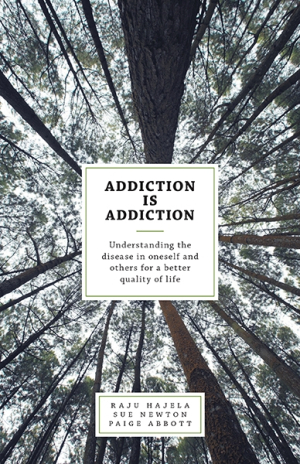Addiction Is Addiction
Understanding the Disease in Oneself and Others for a Better Quality of Life
The mixture of practical information and reassurances make this essential reading for patients and their loved ones.
With their first book, Addiction Is Addiction, Raju Hajela, Sue Newton, and Paige Abbott aim to foster “more open and honest dialogues about the role of Addiction in society, without stigma or judgment.” This comprehensive, well-organized guide discusses the features of addictive thinking and feeling, suggests holistic recovery methods, and offers useful definitions, diagrams, and case studies.
The authors are affiliated with Health Upwardly Mobile Inc., a health and wellness company based in Calgary, Alberta. Tracing the history of addiction back to the eighteenth century, when it was first known as “alcoholic disease syndrome,” they present an expert view of the disease’s symptoms and outlook. By stressing that addiction is a “chronic brain disease” rather than a “moral failing or personal weakness,” they evince a compassionate perspective that will encourage patients and their family members to examine their emotions and take a proactive, spiritual approach to recovery.
Addiction is influenced by both genetics and environment, the former accounting for perhaps 50 to 60 percent of incidence. Trauma does not cause it, but can aggravate it. Although the book is full of such relevant background details, the facts never become overwhelming thanks to the variety of materials included. Intriguing case studies, most of them narrated in first person, are set in italics, and diagrams and tables illustrate patients’ likely feelings, relationship roles, and recovery stages. Reading this should be an interactive experience, what with self-assessment questions and affirmations, a journaling template, and a recovery activities checklist with a sample schedule. Extensive endnotes and bibliography plus a helpful glossary provide ample resources for further research, and chapter summaries will ensure that all the take-home messages sink in.
Sometimes the book goes into too much detail for laymen. However, this means that it can be used by professionals as well as patients. An appendix on chakras seems out of place, even with the book’s focus on spiritual means of recovery. The authors have also made the unusual decision to always capitalize Addiction, “to emphasize that it is a proper noun and the name of a serious disease.” That’s as may be, but in practice it can look like a repeated typing mistake. Information appears to be specific to North America, especially when it comes to funding limitations and patient advocacy, but the general principles of care should be applicable worldwide.
This book is strongly recommended to those who have participated in groups like Alcoholics Anonymous or Narcotics Anonymous. The mixture of practical information and reassurances will make it essential reading for patients and their loved ones.
Reviewed by
Rebecca Foster
Disclosure: This article is not an endorsement, but a review. The publisher of this book provided free copies of the book and paid a small fee to have their book reviewed by a professional reviewer. Foreword Reviews and Clarion Reviews make no guarantee that the publisher will receive a positive review. Foreword Magazine, Inc. is disclosing this in accordance with the Federal Trade Commission’s 16 CFR, Part 255.

